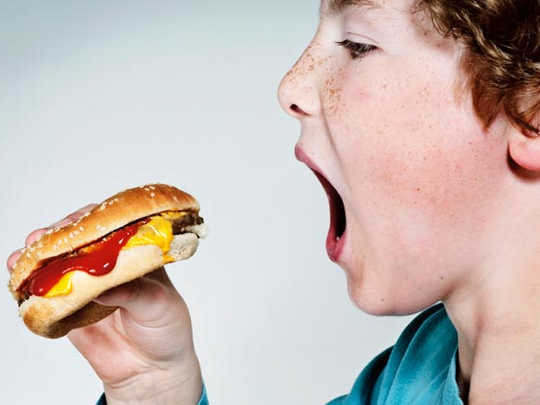
What you eat as a child can have an impact on your IQ – even in your adulthood – according to the findings of a study published in the February 2011 issue of Journal of Epidemiology and Community Health.
The study compared two groups of three-year-old children; one ate a lot of processed foods, sugars and unhealthy fats, while the other ate more fruits and vegetables. It found that by eight and a half, the children who ate processed foods were more likely to have a lower IQ than their healthy counterparts.
Commenting on the findings, British best-selling author and child nutrition expert Annabel Karmel says, “The formative years are crucial and children should eat healthy food containing all the nutrients that are vital for growth. Antioxidants found in fruit and vegetables are particularly important for brain function and boosting memory recall and IQ scores.”
A lack of crucial nutrients found in certain foods can have an impact on your child’s development. According to research conducted by Mayo Clinic, Dubai, iron deficiency due to a lack of foods like fish, skinless chicken and lean beef in your child’s diet can lead to learning difficulties, decreased attention span and lack of concentration.
Most children who don’t eat breakfast do not concentrate in class, says Karmel.
Essential fatty acids (EFAs) found in fish like sardines and salmon ensure healthy functioning of the brain and eyes, and a lack of EFAs in a child’s diet can exacerbate learning disorders like dyslexia and attention deficit disorder.
EFAs are important for brain structure and function but can’t be synthesised by humans so must be obtained from diet. It is believed that children who are dyslexic find it hard to convert dietary EFAs to the long-chain EFAs required by the body for brain and eye function, therefore a deficiency worsens the condition.
To ensure your children get all the required nutrients, Karmel advises giving them five portions of fruit per day. “You can try giving your child a variety of fruits with yogurt or cereal at breakfast because they are rich in antioxidants. In addition, serve vegetables for lunch.
You can also include red meat, which is a good source of iron, a vital nutrient for improving brain power,” she says.
Karmel began focusing on children’s nutrition because her second child was a fussy eater. “I wrote recipes for my son and managed to get him to eat healthy food. I used to take my recipes to the playground and other mums who saw them encouraged me to write a book,” she says.
She worked with nutritionists and allergy experts to write The Complete Baby and Toddler Meal Planner in 1991. She has published more than 24 books and most of them have been translated into other languages.
Speaking exclusively to Friday at Fairmont The Palm, Dubai, where she conducted an interactive cookery demonstration, Karmel says, “It is important to inculcate healthy eating habits in children. You can incorporate an element of fun into the food they love. For example, including an ingredient like grated courgette in cupcakes will encourage your child to eat more vegetables.
“I have seen problems related to child nutrition in the Middle East and want to help mothers bring up their children on healthy diet,” says Karmel.
“In the UAE there is a high incidence of diabetes, hence there is need for kids to eat healthy. I am trying to contribute by equipping parents with knowledge so they can help their children get on a healthy path,” she adds. It may be difficult at times to get your children to eat healthy food, especially if they are fussy eaters.
Karmel says children normally eat when they are hungry, so avoid giving them a lot of snacks between meals. “Try to make the presentation fun, for example cut fruit in different shapes or skewer the fruits to make kebabs. Involving children in grocery shopping, planning meals and letting older ones assist with the cooking makes meal times more enjoyable. Avoid keeping junk food in the house – it helps reduce temptation,” she says.
Top foods your child should be eating
Karmel’s picks will benefit your child by promoting growth, boosting energy, improving immunity against illness and helping with the formation of strong bones and teeth.
Berries: Strawberries, blackberries, blueberries and cranberries are high in fibre, vitamins, minerals and antioxidants. Rich in folic acid and vitamin C, berries boost the child’s immune system and promote healthy brain development.
Vegetables: Carrots and broccoli are rich in vitamin C and beta-carotene, which improves immunity and destroys free radicals. Broccoli also contains calcium,
an important mineral for the maintenance of bones and teeth.
Oily fish: Salmon and sardines have high content of omega-3 fatty acids, which promote proper functioning of the brain and nervous system. They are also prime sources of proteins, vitamin A and B vitamins.
Chicken: A good source of protein and essential amino acids, which promote growth and development. Give your child chargrilled chicken, chicken satay with peanut butter or chicken-breast burger.
Red meat: Consumption of lean red meat in moderation has health benefits for children because it is packed with vitamins and minerals such as iron, protein, zinc, vitamin D and B vitamins. All these nutrients provide energy and are essential for growth.
Wholegrain cereals: Muesli is made up of nutrient-rich ingredients like nuts, fruits, seeds and oats, which improve concentration and alertness. It is also rich in fibre, which is good for healthy bowel movement.
Eggs: They are rich in protein, potassium, vitamin A, and B vitamins like folic acid that strengthen your child’s immune system.
No-no foods
- Fizzy drinks are sugary (a 300ml can of a fizzy drink contains ten cubes of sugar), refined and don’t give nutrients. They also take away appetite.
- Store-bought pizzas and nuggets have a lot of salt.
- Cut down on fruit juice and smoothies as they contain a lot of sugar. Instead encourage children to eat fruits – orange pith has more fibre than orange juice.
What to stock up on
Busy parents find it very hard to do a completely healthy meal plan for kids every day, that is why it is important to know how to shop and prepare food. Karmel says it always helps to buy seeds. Pumpkin seeds, which are rich in zinc, are good – toast them in Worcestershire sauce and butter and give to older children. Avoid giving them to younger children as they may choke.
Edamame is another good ingredient – boil it in salted water and serve as an appetizer. “Stock up on chicken, pasta, tuna, sauces such as teriyaki, frozen vegetables like peas, cheese, fish and mince. You can use these ingredients to make a meal in five minutes,” says Karmel.
Wraps are also popular with children. You can throw in vegetables, tomato, cheese and chicken. Alternatively try noodles, peas, corn and teriyaki sauce.
Healthy cooking techniques
You can buy healthy ingredients but if you don’t know how to prepare them properly it may be a waste of money, because the way you cook your food can affect its calories and nutrients. Here are some healthy cooking methods:
Steaming: It is advisable to steam vegetables such as broccoli and carrots as opposed to boiling in water because steaming lets them retain their nutrients.
Also steamed vegetables are soft and easy to digest, meaning all the nutrients are easily absorbed into your child’s body. Another advantage of steaming is that it uses little or no oil. If you have to add some, use olive oil – an unsaturated fat that does not contain bad cholesterol.
Poaching: This method also uses little or no oil. Its advantage is that it preserves moisture and adds flavour without adding fat – this means no extra calories are added to the meal.
Grilling: Grilled chicken is lean, delicious and doesn’t contain many calories. According to the USDA Nutrient Database, half a chicken breast fried in a batter coating contains 364 calories; the same in a flour coating contains 218 calories; half a skinless, roasted chicken breast contains 142 calories; while the same amount of grilled chicken is just 60 to 90 calories.
It’s always best to marinate chicken overnight so it absorbs flavours before you grill it.












